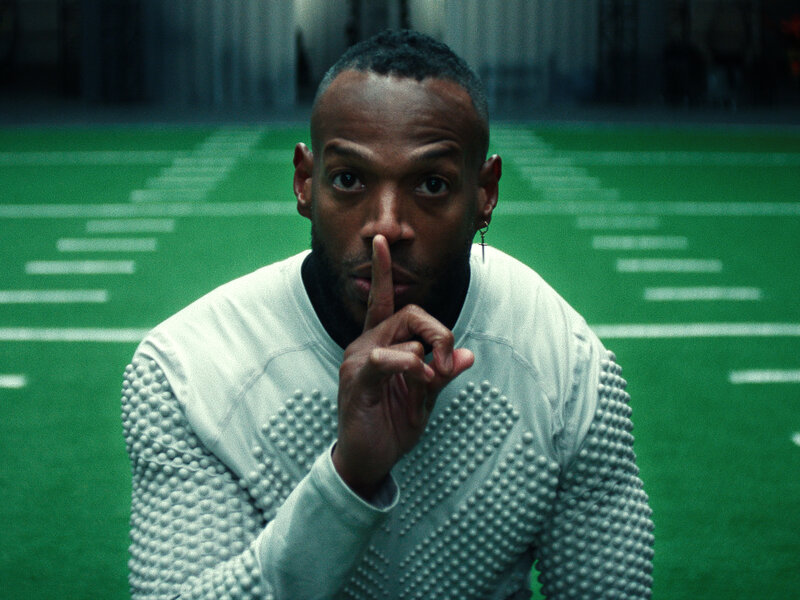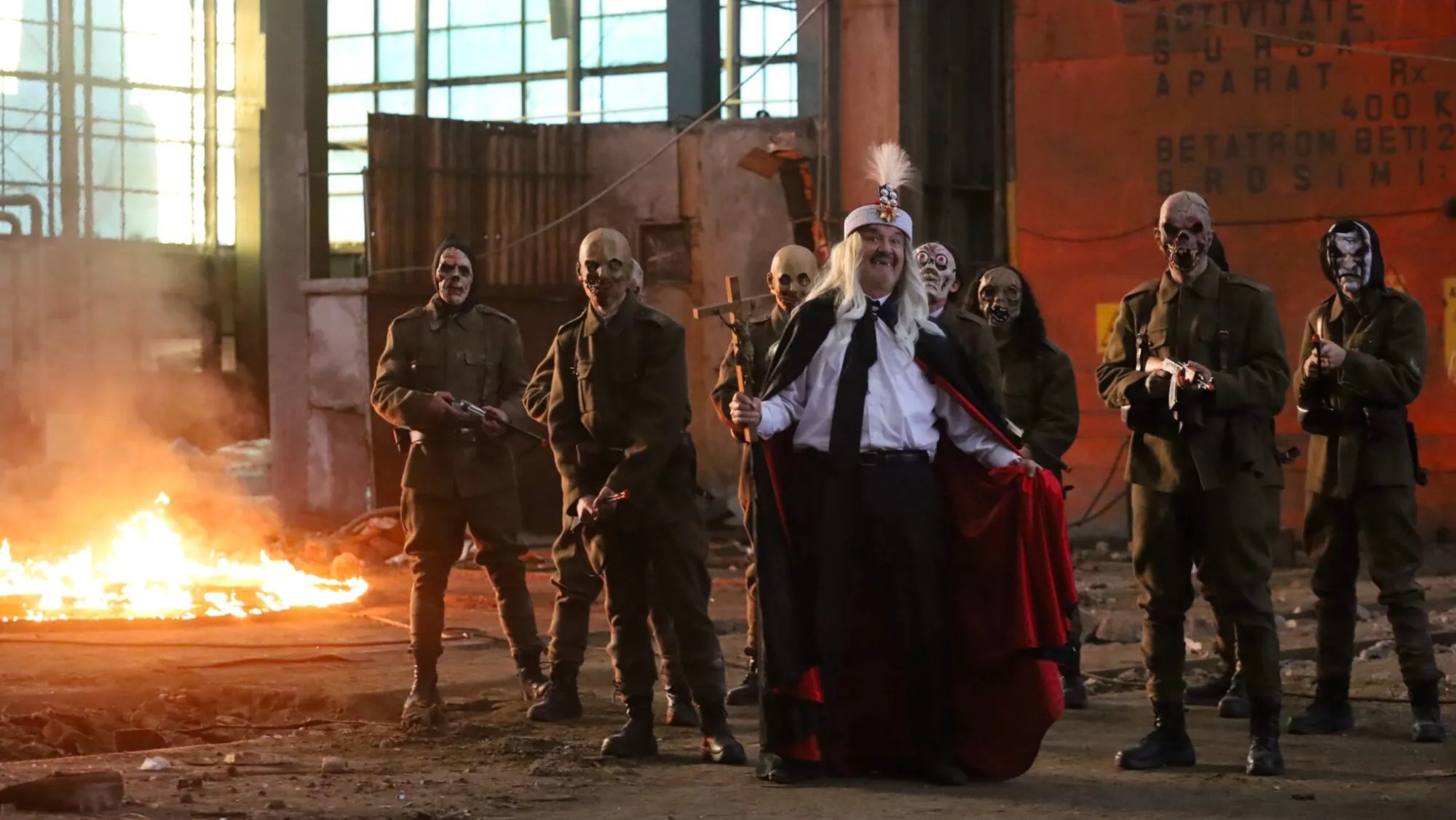![]()
How does one make sense of a film with so much possible greatness that spectacularly fails on every meaningful level? The new psychological horror film produced by Jordan Peele set in the modern-day gladiatorial world of American football has so much potential coursing through its veins. A strikingly photographed film featuring some astonishing imagery, provocative themes and a career-best turn from star Marlon Wayans; how could this possibly fail to live up to the hype? What results is a baffling misfire that will leave audiences both frustrated and unsatisfied.

Courtesy Universal
Cameron Cade (Tyriq Withers) is a college football phenom with aspirations of becoming the next GOAT (greatest of all time) of football. Having been raised on football by his family, specifically the fictional San Antonio Saviors and their star quarterback and 8x-champion Isaiah White (Marlon Wayans), Cameron has always chased his dream of reigning atop the football world. After rumors circulate that his idol, White, is potentially retiring after nearly two decades in the league, Cameron sees his opportunity to fulfill his potential of becoming the GOAT. With the combine soon underway, Cameron suffers a traumatic brain injury from a random attacker that threatens his potential future. When he decides to skip the combine, his opportunistic agent (the always welcome Tim Heidecker) gets a call that Isaiah White wants Cameron to travel to his private compound, located deep in the desert, and train with him for a week. Looking to potentially pass the baton onto the young star, Isaiah will show Cameron what it takes to be great, subjecting him to countless sinister training methods and psychological manipulation. Alongside his influencer wife Elsie (Julia Fox, infusing just the right amount of camp) and entourage, Isaiah entices Cameron into his alluring world of fame and power. However, things are far more deadly than they initially appear, forcing Cameron to rethink everything he knows about the sport of football and his lifelong idol.
Directed by Justin Tipping, Him utilizes an abrasive visual language to punctuate the hard-hitting brutality of the football world. Steeped in a darkly sinister tone, Tipping displays a constant array of stunning visuals and unique shooting styles. Whether its using thermal or x-ray cameras to emphasize the sheer trauma inflicted upon Cameron, Him maintains a precise, splashy showcase of symmetry and skilled framing that holds your attention even when the film struggles to make sense of these images. Cinematographer Kira Kelly (Rez Ball) makes every texture pop and every shade of neon flourish to seer into your retinas. It’s a great deal of dazzling, visceral style, overflowing with conceptual imagery, but is routinely undercut by a half-baked center.
Star Marlon Wayans gives his most intense, committed dramatic performance yet, one that continuously shows glimmers of the film this could have been. His dynamic, live-wire performance is a real treat to witness. We see Isaiah welcoming Cameron in with open arms alongside moments of genuine wisdom and guidance. Yet, in the same scene he’ll mercilessly break down the young QB with a full-throated verbal assault that is more unsettling than any of the intended scares here. Simply put, you can’t take your eyes off of Wayans and his work in this highlights a new range for him as an actor. It’s rather tragic the film around him fails to support his sensational work.

Courtesy Universal
Him has so many obvious missed opportunities and gaps in both narrative and character beats. Story cohesion often feels muddled, feeling like the film was either rewritten or re-edited within an inch of itself. It has nothing to say about its most intriguing ideas. Tipping’s film doesn’t develop its themes so much as it picks at them. Questions of the means of sacrifice, fame and religion and the “what if” of sports gods being real. At one point Isaiah confides in Cameron stating “as a black quarterback, I had to be great just to be good”. These are legitimately enticing questions that the film never seems to care about answering or even remotely exploring. Instead, Tipping relies on hazy montages and surreal visual metaphors
As dazzling as these montages and sequences can be, the meat of the story is all but overlooked or flat-out ignored. The idea of sports being a religion isn’t anything new, but Him takes these strands and hammers the audience with it. Satanic rituals and biblical imagery become intertwined, so much so that Tipping even recreates the “The Last Supper” with crusty white team owners. Tipping’s second half in particular is plagued by monotonous nightmare sequences that rarely provide depth or insight. Having such a heavy emphasis on dream sequences and hallucinations means that Tipping consistently undercuts the stakes of his own film. At a certain point, the audience is left stranded trying to decipher whether the most recent disturbing occurrence actually happened and what that means for the characters. So many fakeouts ultimately render the film both dramatically and narratively inert.
As the young football prodigy, Tyriq Withers, a former wide receiver at Florida State, does the most of what he can with a flimsy, thinly-veiled role. Withers is a naturally charismatic screen presence and obviously has the physicality to portray a gifted football star, but the character is such a blank slate, we never quite understand him. For someone so dedicated to being great, the character is strangely doe-eyed and passive when it comes to witnessing horrific violence. His motivations largely seem dictated by where the plot needs him to go, leaving an unnatural collection of character decisions.

Courtesy Universal
Him is the year’s most frustrating film. Director Justin Tipping showcases a wealth of visual stylings backed by a lively hip hop-infused soundtrack featuring old cuts from Mobb Deep and Gucci Mane, to original tracks by Denzel Curry and Tierra Whack. His film nearly skates by off its astonishing visuals and commanding performances, but leans so heavily into its allegory-heavy imagery, the dramatic stakes are all but gone by the time it arrives to its lousy climax. Tipping had the opportunity to make something of a Damn Yankees for the modern era, but falls flat on his face with a film that will likely have audiences leaving the theater asking “what went wrong?”.
Him is now playing in theaters.








Major disappointment. A creepy, sick film . and the ending. Little to no redeeming qualities in this film.one of the worst of the year. 1.5 of 4 stars
I’ll check it out, but I won’t be optimistic on watch a good film.
This is really disappointing to see. I hoped for so much more.